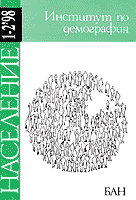ПОЛИТИКА СЕМЬИ - ФАКТОРЫ, ВЛИЯЮЩИЕ НА ЕЕ РАЗВИТИЕ И СПЕЦИФИКУ
Family Policy - Factors Influencing its Development and its Specifics
Author(s): Mariana KeremidchievaSubject(s): Social Sciences
Published by: Институт за изследване на населението и човека - Българска академия на науките
Summary/Abstract: This article argues on the thesis that family policy is connected to multiple and diverse processes that make it itself in a process of continuous change. It emphasizes also that the nature of links is such that family policy may define the character and the development of these processes. The thesis itself is defended using analysis of three groups of factors and the impact of their change on family policy. The first group of factors refers to demographic changes during the last decades which the author groups in five basic directions. Each one of them is discussed separately, inferring the fundamental tendencies in the countries of Western and Eastern Europe by placing an accent on their specifics in Bulgaria. The second group of factors considers the overall economic situation. Special attention is attributed to the transition in Bulgaria and the accompanying crisis. The research here ends with inferences that are general and are also specified for Bulgaria. The last group of factors refers to social changes. Along with changes specified by countries, such as increasing employment of women, sex equality, etc., the article discusses also those that are typical for Bulgaria: polarization of the social structure, demolition of the value system, growth of drug abuse, crime, prostitution, etc. The conclusion underlies some basic aspects of factors and role of family institution during the changing circumstances of the 90s.
Journal: Население
- Issue Year: 1998
- Issue No: 1+2
- Page Range: 104-122
- Page Count: 19
- Language: Bulgarian
- Content File-PDF

